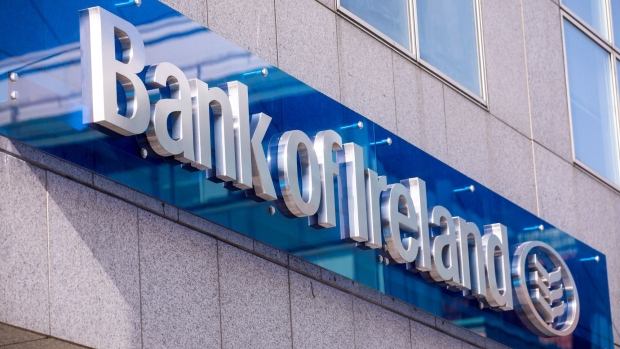Sep 29, 2022
Bank of Ireland Hit with Record Fine in Tracker Mortgage Scandal
, Bloomberg News

(Bloomberg) -- Ireland’s Central Bank fined Bank of Ireland Plc a record €100.5 million ($97 million) for its role in a mortgage overcharging scandal, the final chapter in a years-long saga that has seen penalties issued across the country’s banking sector.
The Central Bank reprimanded the lender for “significant and long-running failings” in respect of 15,910 tracker mortgage customer accounts which were impacted between August 2004 and June 2022, it said in a statement. Bank of Ireland admitted in full to 81 separate regulatory breaches.
The bank’s failures resulted in the loss of 50 properties, including 25 family homes, “which would have been avoided if Bank of Ireland had complied with the most basic and fundamental of its consumer protection obligations,” the Central Bank said.
Bank of Ireland had already set aside €94 million to deal with tracker-related issues, including enforcement action. The Central Bank had determined the appropriate fine to be €143.6 million which was reduced by 30% to €100.5 million in accordance with the settlement discount scheme provided for in the Central Bank’s Administrative Sanctions Procedure.
“What took place in relation to tracker mortgages was wrong,” said Gavin Kelly, interim chief executive officer of Bank of Ireland Group. “It should never have happened. We are very sorry that it did.”
Lengthy Saga
The scandal has embroiled Irish banking for almost a decade. So-called tracker mortgages were popular in Ireland before the global financial crisis hit in 2008. When bank funding costs soared and then interest rates plunged during the crisis, those loans began to lose money. Many customers were later placed on an incorrect rate.
The Central Bank’s investigation found that Bank of Ireland provided unclear contractual documents to its customers, failed to warn customers about the consequences of decisions relating to their mortgage, implemented an unfair complaints handling practice and wrongly excluded customers from an industry-wide examination of tracker mortgage related issues.
“Our investigation exposed a culture in Bank of Ireland which, when faced with a choice, prioritised its own interests with little to no regard for the impacts on its customers,” said Seána Cunningham, the Central Bank’s director of enforcement and anti-money laundering. “Bank of Ireland repeatedly interpreted unclear contractual terms in its own favor and against the customer, which continued the harm and loss caused to customers over many years.”
The Central Bank ordered lenders that offered tracker mortgages to review their loan books in 2015. In June the regulator fined AIB Group Plc. a then-record €96.7 million for its role. It had already issued penalties to NatWest Group Plc’s Ulster Bank, Permanent TSB Group Holdings Plc and KBC Group NV’s Irish unit over the issue.
Thursday’s fine brings total penalties related to the Central Bank’s tracker mortgages investigation to about €278 million, Deputy Governor Derville Rowland said Thursday.
“This is the largest fine that the central bank has ever imposed and it demonstrates that firms will be held to account for the consequences of their actions,” Rowland said in a briefing.
Read More: Irish Bankers Tarnished Again as Mortgage Scandal Mounts (1)
The development comes a week after it was announced that the Irish government had exited its stake in Bank of Ireland, making it the first lender bailed out during the financial crisis to return to full private ownership. The completion of the state’s share sale is likely to revive discussions about bankers’ salaries, which were capped at €500,000 under state ownership and bonuses effectively banned.
Bank of Ireland’s former CEO Francesca McDonagh left the bank earlier this month for Credit Suisse Group AG and the lender has yet to announce her successor.
(Adds cumulative amount of fines, quote from Central Bank’s Deputy Governor in 10th and 11th paragraphs)
©2022 Bloomberg L.P.






